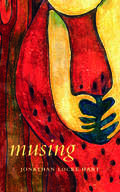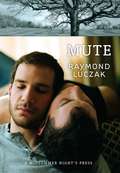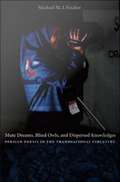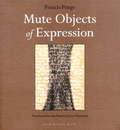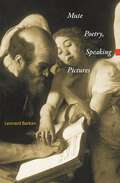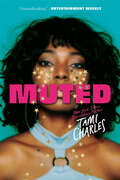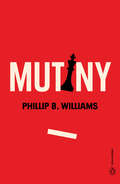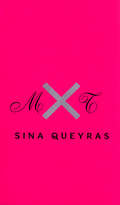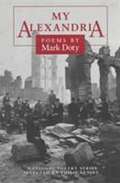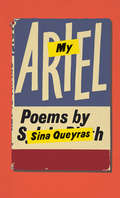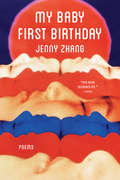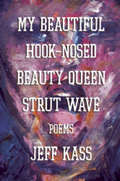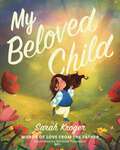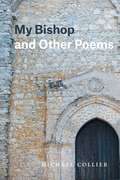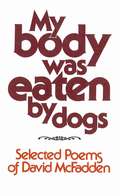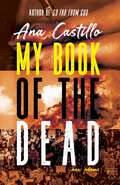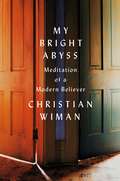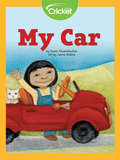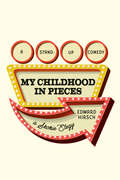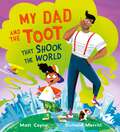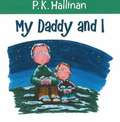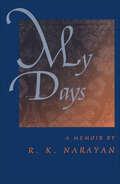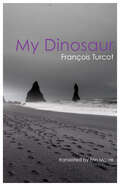- Table View
- List View
Musing
by Jonathan Locke HartMusing is a book of sonnets. Working within the framework of a classic poetic form, Jonathan Locke Hart embarks on an extended meditation on our rootedness in landscape and in the past. As sonnets, the poems are a mixture of tradition and innovation. Throughout, Hart deftly interweaves European culture with North American settings and experience. The collection opens with a foreword by noted literary scholar Gordon Teskey, who reflects on the themes that have marked the evolution of Hart's poetry. Of Musing, Teskey writes: "These deeply thoughtful poems bring layered historical consciousness into the sonnet. They also touch and stir the heart through all its levels."
Mute
by Raymond Luczak<P>Do not be afraid of your face Move into a beam of light in the bar. Smile openly Watch his hands move quicker than strobe lights as he surveys the crowd with his friends Do not think of how hard it might be to have a casual conversation. <P>From "How to Fall for a Deaf Man" <P>Silence is always a powerful statement, but even more so in the hands of Raymond Luczak, who demonstrates in his third collection what it's like to navigate between the warring languages of confusion and clarity. <P>As a deaf gay man in the hearing world, he lends an unforgettable voice to his reality of ache and loss beyond the inadequate translation of sound.
Mute Dreams, Blind Owls, and Dispersed Knowledges: Persian Poesis in the Transnational Circuitry
by Michael M. J. FischerOver the past decade Iranian films have received enormous international attention, garnering both critical praise and popular success. Combining his extensive ethnographic experience in Iran and his broad command of critical theory, Michael M. J. Fischer argues that the widespread appeal of Iranian cinema is based in a poetics that speaks not only to Iran's domestic cultural politics but also to the more general ethical dilemmas of a world simultaneously torn apart and pushed together. Approaching film as a tool for anthropological analysis, he illuminates how Iranian filmmakers have incorporated and remade the rich traditions of oral, literary, and visual media in Persian culture. Fischer reveals how the distinctive expressive idiom emerging in contemporary Iranian film reworks Persian imagery that has itself been in dialogue with other cultures since the time of Zoroaster and ancient Greece. He examines a range of narrative influences on this expressive idiom and imagery, including Zoroastrian ritual as it is practiced in Iran, North America, and India; the mythic stories, moral lessons, and historical figures written about in Iran's national epic, the Shahnameh; the dreamlike allegorical world of Persian surrealism exemplified in Sadeq Hedayat's 1939 novella The Blind Owl; and the politically charged films of the 1960s and 1970s. Fischer contends that by combining Persian traditions with cosmopolitan influences, contemporary Iranian filmmakers--many of whom studied in Europe and America--provide audiences around the world with new modes of accessing ethical and political experiences.
Mute Objects of Expression
by Francis Ponge Lee FahnestockFrancis Ponge boldly proclaims his poetic goal in Mute Objects of Expression: "To accept the challenge that objects offer to language." These objects--less chosen than received spontaneously--are perceived with inimitable Pongean humor and rendered into glimmering still lifes. He gives voice to the often unnoticed aspects of natural objects and beings. Shunning familiar poetic modes, Ponge forges new visions, images drawn from nature, from mythology and the classics. In this volume, springing from the Loire countryside in the early 1940s, Ponge's "prôems" recall the violent perfume of the mimosa, the cries of carnations, and the flirtations of wasps. From a small note- book, his sole supply of paper withinthe wartime deprivations, he composes repeated drafts of an innovative form combining poetry with analysis and impish play. Despite the demoralizing clouds of Occupation, Ponge wrests a soaring paean to his beloved sliver of Provence.
Mute Poetry, Speaking Pictures (Essays in the Arts)
by Leonard BarkanThe skirmish between painting and poetry—from Plato and Praxiteles to Rembrandt and ShakespeareWhy do painters sometimes wish they were poets—and why do poets sometimes wish they were painters? What happens when Rembrandt spells out Hebrew in the sky or Poussin spells out Latin on a tombstone? What happens when Virgil, Ovid, or Shakespeare suspend their plots to describe a fictitious painting? In Mute Poetry, Speaking Pictures, Leonard Barkan explores such questions as he examines the deliciously ambiguous history of the relationship between words and pictures, focusing on the period from antiquity to the Renaissance but offering insights that also have much to say about modern art and literature.The idea that a poem is like a picture has been a commonplace since at least ancient Greece, and writers and artists have frequently discussed poetry by discussing painting, and vice versa, but their efforts raise more questions than they answer. From Plutarch ("painting is mute poetry, poetry a speaking picture") to Horace ("as a picture, so a poem"), apparent clarity quickly leads to confusion about, for example, what qualities of pictures are being urged upon poets or how pictorial properties can be converted into poetical ones.The history of comparing and contrasting painting and poetry turns out to be partly a story of attempts to promote one medium at the expense of the other. At the same time, analogies between word and image have enabled writers and painters to think about and practice their craft. Ultimately, Barkan argues, this dialogue is an expression of desire: the painter longs for the rich signification of language while the poet yearns for the direct sensuousness of painting.
Muted
by Tami CharlesA ripped-from-the-headlines novel of ambition, music, and innocence lost, perfect for fans of Elizabeth Acevedo and Jason Reynolds!Be bold. Get seen. Be Heard.For seventeen-year-old Denver, music is everything. Writing, performing, and her ultimate goal: escaping her very small, very white hometown.So Denver is more than ready on the day she and her best friends Dali and Shak sing their way into the orbit of the biggest R&B star in the world, Sean "Mercury" Ellis. Merc gives them everything: parties, perks, wild nights -- plus hours and hours in the recording studio. Even the painful sacrifices and the lies the girls have to tell are all worth it.Until they're not.Denver begins to realize that she's trapped in Merc's world, struggling to hold on to her own voice. As the dream turns into a nightmare, she must make a choice: lose her big break, or get broken.Inspired by true events, Muted is a fearless exploration of the dark side of the music industry, the business of exploitation, how a girl's dreams can be used against her -- and what it takes to fight back.
Mutiny (Penguin Poets)
by Phillip B. WilliamsFrom the critically acclaimed author of Thief in the Interior who writes with "a lucid, unmitigated humanity" (Boston Review), a startling new collection about revolt and renewalMutiny: a rebellion, a subversion, an onslaught. In poems that rebuke classical mythos and western canonical figures, and embrace Afro-Diasporanfolk and spiritual imagery, Phillip B. Williams conjures the hell of being erased, exploited, and ill-imagined and then, through a force and generosity of vision, propels himself into life, selfhood, and a path forward. Intimate, bold, and sonically mesmerizing, Mutiny addresses loneliness, desire, doubt, memory, and the borderline between beauty and tragedy. With a ferocity that belies the tenderness and vulnerability at the heart of this remarkable collection, Williams honors the transformative power of anger, and the clarity that comes from allowing that anger to burn clean.
MxT
by Sina QueyrasMxT, or 'Memory x Time,' is one of the formulas acclaimed poet Sina Queyras posits as a way to measure grief. These poems mourn the dead by turning memories over and over like an old coin, by invoking other poets, by appropriating the language of technology, of instruction, of diagram, of electrical engineering, and of elegy itself. Devastating, cheeky, allusive, hallucinatory: this is Queyras at her most powerful.
My Alexandria: Poems
by Mark DotyIn the search for his Alexandria, the holy city of the imagination where he might find love, transcendence, and beauty, the poet has gone into the actual cities of the world where he has found us, the unloved, the dying, the survivors, among the wreckage of our lives.
My Ariel
by Sina Queyras Sina QueyrasWhere were you when you first read Ariel? Who were you? What has changed in your life? In the lives of women? In My Ariel, Sina Queyras barges into one of the iconic texts of the twentieth century, with her own family baggage in tow, exploring and exploding the cultural norms, forms, and procedures that frame and contain the lives of women.
My Baby
by Carly Jayne RoachMy Baby is a heartwarming book that promotes early bonding between mother and baby, written by an author who gave birth during the COVID pandemic. With sweet and simple rhymes, the author conveys the love, kisses, and cuddles shared between mother and baby, as they embark on their journey of growth together. This book is a must-have for new mums, as it provides a beautiful and intimate way to connect with their babies during those early stages of life. With stunning illustrations that capture the tender moments between mother and child, readers will feel a deep sense of oneness with their little one. Whether you’re a new mum, or searching for the perfect baby shower gift, My Baby is a touching and meaningful addition to any family’s bookshelf. It’s a reminder that the love between a mother and baby is powerful and enduring, and something to be cherished for a lifetime.
My Baby First Birthday
by Jenny ZhangRadiant and tender, My Baby First Birthday is a collection that examines innocence, asking us who gets to be loved and who has to deplete themselves just to survive. Jenny Zhang writes about accepting pain, about the way we fetishize womanhood and motherhood, and reduce women to their violations, traumas, and body parts. She questions the way we feminize and racialize nurturing, and live in service of other people’s dreams. How we idealize birth and being baby, how it’s only in our mothers’ wombs that we’re still considered innocent, blameless, and undamaged, because it’s only then that we don’t have to earn love. Her poems explore the obscenity of patriarchy, whiteness, and capitalism, the violence of rescue and heroism. The magic trick in My Baby First Birthday is that despite all these themes, the book never feels like some jeremiad. Zhang uses friendship as a lyric. She seeks tenderness, radiant beauty, and having love for your mistakes. Through all this, she writes about being alone—really alone, like why-was-I-ever-born alone—and trying, despite everything, to reach out and touch something—skin to skin, animal to animal.
My Beautiful Hook-Nosed Beauty Queen Strut Wave
by Jeff KassIt's hard to be a teacher. Hard to be a father. Harder still to be a husband. So what can you do? How do you survive? You look for joy everywhere you can. You write poems about these moments to keep them alive in your breast. These poems represent hope for a better tomorrow.
My Beloved Child: Words of Love from the Father
by Sarah KrogerA picture book of affirmations inspired by Scripture from contemporary singer-songwriter Sarah Kroger, My Beloved Child: Words of Love from the Father shows children just how big and never-ending God's love is for them.Inspired by Sarah's viral song "Belovedness," this lyrical message is written like a love letter from God to his beloved children. Using Scripture as the text's foundation, little readers will be reminded of God's great love and powerful truths with each page turned. Children will learn that being a child of God--a beloved--means His love can't be taken away or erased. It's their identity as sons and daughters of a loving heavenly Father.This sweet and tender book for girls and boys ages 4 to 8reassures kids of God's love for them;includes popular and powerful Bible verses, such as Psalm 139:14 and Isaiah 43:1;features beautiful illustrations from Dikshaa Pawaskar; andis a perfect gift for a baby shower, baptism, baby dedication, or child's birthday.Give your child the gift of knowing they are deeply loved by God--let My Beloved Child be the reminder they carry with them always.
My Bishop and Other Poems (Phoenix Poets)
by Michael CollierThink of a time when you’ve feigned courage to make a friend, feigned forgiveness to keep one, or feigned indifference to simply stay out of it. What does it mean for our intimacies to fail us when we need them most? The poems of this collection explore such everyday dualities—how the human need for attachment is as much a source of pain as of vitality and how our longing for transcendence often leads to sinister complicities. The title poem tells the conflicted and devastating story of the poet’s friendship with the now-disgraced Bishop of Phoenix, Arizona, interweaving fragments of his parents’ funerals, which the Bishop concelebrated, with memories of his childhood spiritual leanings and how they were disrupted by a pedophilic priest the Bishop failed to protect him from. This meditation on spiritual life, physical death, and betrayal is joined by an array of poised, short lyrics and expansive prose poems exploring how the terror and unpredictability of our era intrudes on our most intimate moments. Whether Michael Collier is writing about an airline disaster, Huey Newton’s trial, Thomas Jefferson’s bees, a piano in the woods, or his own fraught friendship with the disgraced Catholic Bishop, his syntactic verve, scrupulously observed detail, and flawless ear bring the felt—and sometimes frightening—dimensions of the mundane to life. Throughout, this collection pursues a quiet but ferocious need to get to the bottom of things.
My Book of the Dead: New Poems
by Ana CastilloFor more than thirty years, Ana Castillo has been mesmerizing and inspiring readers from all over the world with her passionate and fiery poetry and prose. Now the original Xicanista is back to her first literary love, poetry, and to interrogating the social and political upheaval the world has seen over the last decade. Angry and sad, playful and wise, Castillo delves into the bitter side of our world—the environmental crisis, COVID-19, ongoing systemic racism and violence, children in detention camps, and the Trump presidency—and emerges stronger from exploring these troubling affairs of today. Drawings by Castillo created over the past five years are featured throughout the collection and further showcase her connection to her work as both a writer and a visual artist. My Book of the Dead is a remarkable collection that features a poet at the height of her craft.
My Bright Abyss: Meditation Of A Modern Believer
by Christian WimanSeven years ago, Christian Wiman, a well-known poet and the editor of Poetry magazine, wrote a now-famous essay about having faith in the face of death. My Bright Abyss, composed in the difficult years since and completed in the wake of a bone marrow transplant, is a moving meditation on what a viable contemporary faith—responsive not only to modern thought and science but also to religious tradition—might look like. Joyful, sorrowful, and beautifully written, My Bright Abyss is destined to become a spiritual classic, useful not only to believers but to anyone whose experience of life and art seems at times to overbrim its boundaries. How do we answer this “burn of being”? Wiman asks. What might it mean for our lives—and for our deaths—if we acknowledge the “insistent, persistent ghost” that some of us call God? One of Publishers Weekly's Best Religion Books of 2013.
My Car
by Karen KlozenbucherClimb in my car, Quick, quick, quick. Turn the key, Click, click, click.
My Cat Likes to Hide in Boxes
by Eve SuttonThe cat from France likes to sing and dance. The cat from Norway got stuck in the doorway. But MY cat likes to hide in boxes.
My Childhood in Pieces: A Stand-Up Comedy, a Skokie Elegy
by Edward HirschFrom the award-winning poet, dark comic microbursts of prose deliver a whole childhood, at the hands of an aspiring middle-class Jewish family whose hard-boiled American values and wit were the forge of a poet's coming-of-age.&“My grandparents taught me to write my sins on paper and cast them into the water. . . . They didn&’t expect an entire book,&” Hirsch says in the &“prologue&” to this glorious festival of knife-sharp observations. In microchapters—sometimes only a single scathing sentence long—with titles like &“Call to Breakfast,&” &“Pay Cash,&” &“The Sorrow of Manly Sports,&” and &“Aristotle on Lawrence Avenue,&” Eddie&’s gambling father, Ruby, son of a white metal smelter, schools him and his sister in blackjack; Eddie&’s mom bangs pots to wake the kids to a breakfast of cold cereal; Uncle Bob, in the collection business, is heard threatening people on the phone; and nobody suffers fools. In this household, Eddie learned to jab with his left and cross with his right, never to kid a kidder, and how to sneak out at night. Affectionate, deadpan, and exuberant, steeped in Yiddishkeit and Midwestern practicality, Hirsch&’s laugh-and-cry performance animates a heartbreaking odyssey, from the cradle to the day he leaves home, armed with sorrow and a huge store of poetic wit.
My Dad and the Toot that Shook the World
by Matt CoyneThe perfect Father's Day gift for tooting dads everywhere! All aboard the Butt Force One! Travel the world and back again in this TOOT-ally hilarious rhyming romp following the most destructive fart to ever be farted! When Eddie's dad lets off a ground-shakingly shocking fart, they know it's about to take the world by stinky storm. And only they can stop it . . .Get ready for a toot-acular, rip-roaring, globe-spanning adventure to catch the powerful parp!Perfect for children (and adults) who love a little potty-humour! Written by - but not inspired by - Matt Coyne, bestselling author and creator of the Man vs. Baby blog, with EXPLOSIVE illustrations by Richard Merritt.Praise for Matt Coyne:'A hero for dads everywhere' Daily Mirror'Very, very funny' This Morning'Matt Coyne's post has struck a chord with parents from all over the world' Daily Mail'Brutally honest rant on the reality of parenthood has taken the internet by storm' Sunday Telegraph
My Daddy and I
by P. K. HallinanThis work is for ages 3-5. This is a story that perfectly illustrates the loyalty and love that grows between a father and his children. Whimsical illustrations bring the characters to life in this gentle world Hallinan has created.
My Days: A Memoir
by R. K. Narayan"I am inclined to call this the last chapter, but how can an autobiography have a final chapter? At best, it can only be a penultimate one; nor can it be given a rounded-off conclusion, as is possible in a work of fiction." So begins the last chapter of My Days, the only memoir from R. K. Narayan, hailed as "India's most notable novelist and short-story writer" by the New York Times Book Review.In his usual winning, humorous style, R. K. Narayan shares his life story, beginning in his grandmother's garden in Madras with his ferocious pet peacock. As a young boy with no interest in school, he trains grasshoppers, scouts, and generally takes part in life's excitements. Against the advice of all, especially his commanding headmaster father, the dreaming Narayan takes to writing fiction, and one of his pieces is accepted by Punch magazine (his "first prestige publication"). Soon his life includes bumbling British diplomats, curious movie moguls, evasive Indian officials, eccentric journalists, and "the blind urge" to fall in love. R. K. Narayan's larger-than-life perception of the human comedy is at once acute and forgiving, and always true to it.
My Dinosaur (Literature in Translation Series)
by Erín Moure François TurcotThe figure of the father occupies a particularly significant place in Qu�b�coise literature--there's a real fascination with fathers, and this recurring persona populates fiction, films, and the stories people tell of their families and themselves. Thus, it's not surprising that, as he witnessed his own father's frailty, Fran�ois Turcot--one of Quebec's most celebrated young literary voices--would write his own dedication to his vanished father, entitled My Dinosaur. In this, his first collection of poems to be published in English (and translated by renowned poet Er�n Moure), Turcot excavates, reconstructs, and pays tribute not just to the father, but also to the figure of the son, and to writing itself as key to story, emotion, memory, and history.The dinosaur of My Dinosaur is that of the distant father, sought in mourning, by the son. With luminous and lucid writing, Turcot excavates the fossil gaze of his father, in an elated elegy composed of poems both tensed and open, minimalist and talkative, serious and droll, alternating the voice and writings of the father with the fictions and assemblies of the son--reminding us that a man's story can only be told by assembling the shreds and bits that we've accumulated over the course of our lives. As prolonged metaphor for all disappearances and for the endurance of memory, Turcot's meticulous assembly in My Dinosaur is a tribute to all our Dads. Turcot's surprisingly light and wryly humorous poems will resonate deeply with readers who are inquisitive about the role of family and memory in the construction of identity and self. Scholars who are exploring literary work on grief, and anyone who has lost a parent and felt grief but also curiosity about their lives will connect with Turcot's reflections in My Dinosaur. And finally, fans of the poetics and translation practice of Er�n Moure will delight in this new work that has earned comparisons to Moure's own elegiac work in Kapusta (Anansi, 2015).
